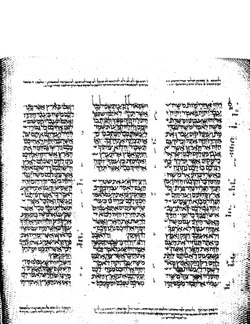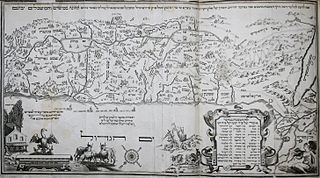
According to the Hebrew Bible, the Tribe of Ephraim was one of the tribes of Israel. The Tribe of Manasseh together with Ephraim formed the House of Joseph. It is one of the ten lost tribes. The etymology of the name is disputed.

According to the Hebrew Bible, the Tribe of Manasseh was one of the Tribes of Israel. It is one of the ten lost tribes. Together with the Tribe of Ephraim, Manasseh also formed the House of Joseph.
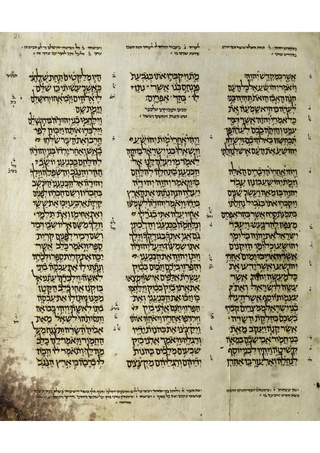
Judges 1 is the first chapter of the Book of Judges, the seventh book of the Hebrew Bible or Old Testament, a sacred text in Judaism and Christianity. With the exception of the first verse, scholars have long recognised and studied the parallels between chapter 1 of Judges and chapters 13 to 19 in the preceding Book of Joshua. Both provide similar accounts of the purported conquest of Canaan by the ancient Israelites. Judges 1 and Joshua 15–19 present two accounts of a slow, gradual, and only partial conquest by individual Israelite tribes, marred by defeats, in stark contrast with the 10th and 11th chapters of the Book of Joshua, which portray a swift and complete victory of a united Israelite army under the command of Joshua.
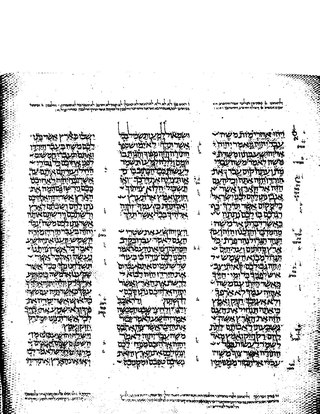
Joshua 2 is the second chapter of the Book of Joshua in the Hebrew Bible or in the Old Testament of the Christian Bible. According to Jewish tradition, the book was attributed to the Joshua, with additions by the high priests Eleazar and Phinehas, but modern scholars view it as part of the Deuteronomistic History, which spans the books of Deuteronomy to 2 Kings, attributed to nationalistic and devotedly Yahwistic writers during the time of the reformer Judean king Josiah in 7th century BCE. This chapter focuses on the spies sent by Joshua to Jericho and their encounter with Rahab, a part of a section comprising Joshua 1:1–5:12 about the entry to the land of Canaan.
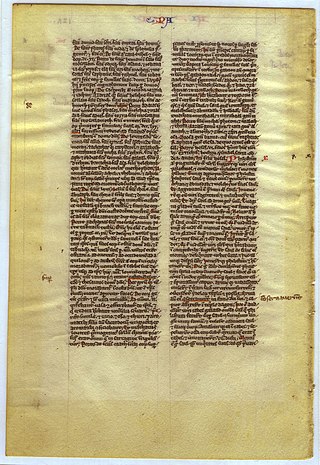
1 Chronicles 7 is the seventh chapter of the Books of Chronicles in the Hebrew Bible or the First Book of Chronicles in the Old Testament of the Christian Bible. The book is compiled from older sources by an unknown person or group, designated by modern scholars as "the Chronicler", and had the final shape established in late fifth or fourth century BCE. This chapter contains the genealogies of tribes settled north of Judah: Issachar, Benjamin, Naphtali, Manasseh, Ephraim and Asher. It belongs to the section focusing on the list of genealogies from Adam to the lists of the people returning from exile in Babylon.

Joshua 24 is the twenty-fourth chapter of the Book of Joshua in the Hebrew Bible or in the Old Testament of the Christian Bible. According to Jewish tradition the book was attributed to the Joshua, with additions by the high priests Eleazar and Phinehas, but modern scholars view it as part of the Deuteronomistic History, which spans the books of Deuteronomy to 2 Kings, attributed to nationalistic and devotedly Yahwistic writers during the time of the reformer Judean king Josiah in 7th century BCE. This chapter records Joshua's final address to the people of Israel, that ends with a renewal of the covenant with YHWH, and the appendices of the book, a part of a section comprising Joshua 22:1–24:33 about the Israelites preparing for life in the land of Canaan.

Joshua 1 is the first chapter of the Book of Joshua in the Hebrew Bible or in the Old Testament of the Christian Bible. According to Jewish tradition the book was attributed to the Joshua, with additions by the high priests Eleazar and Phinehas, but modern scholars view it as part of the Deuteronomistic History, which spans the books of Deuteronomy to 2 Kings, attributed to nationalistic and devotedly Yahwistic writers during the time of the reformer Judean king Josiah in 7th century BCE. This chapter focuses on the commission of Joshua as the leader of Israel after the death of Moses, a part of a section comprising Joshua 1:1–5:12 about the entry to the land of Canaan.

Joshua 22 is the twenty-second chapter of the Book of Joshua in the Hebrew Bible or in the Old Testament of the Christian Bible. According to Jewish tradition the book was attributed to the Joshua, with additions by the high priests Eleazar and Phinehas, but modern scholars view it as part of the Deuteronomistic History, which spans the books of Deuteronomy to 2 Kings, attributed to nationalistic and devotedly Yahwistic writers during the time of the reformer Judean king Josiah in 7th century BCE. This chapter records the mediation for the issue of the establishment of an altar on the east back of Jordan River, a part of a section comprising Joshua 22:1–24:33 about the Israelites preparing for life in the land of Canaan.

Joshua 4 is the fourth chapter of the Book of Joshua in the Hebrew Bible or in the Old Testament of the Christian Bible. According to Jewish tradition the book was attributed to Joshua, with additions by the high priests Eleazar and Phinehas, but modern scholars view it as part of the Deuteronomistic History, which spans the books of Deuteronomy to 2 Kings, attributed to nationalistic and devotedly Yahwistic writers during the time of the reformer Judean king Josiah in 7th century BCE. This chapter focuses on the Israelites crossing the Jordan River westward into the land of Canaan under the leadership of Joshua, a part of a section comprising Joshua 1:1–5:12 about the entry to the land of Canaan.

Joshua 5 is the fifth chapter of the Book of Joshua in the Hebrew Bible or in the Old Testament of the Christian Bible. According to Jewish tradition, the book was attributed to the Joshua, with additions by the high priests Eleazar and Phinehas, but modern scholars view it as part of the Deuteronomistic History, which spans the books of Deuteronomy to 2 Kings, attributed to nationalistic and devotedly Yahwistic writers during the time of the reformer Judean king Josiah in 7th century BCE. This chapter focuses on the circumcision and Passover of the Israelites after crossing the Jordan River under the leadership of Joshua, a part of a section comprising Joshua 1:1–5:12 about the entry to the land of Canaan, and the meeting of Joshua with the Commander of the Lord's army near

Joshua 12 is the twelfth chapter of the Book of Joshua in the Hebrew Bible or in the Old Testament of the Christian Bible. According to Jewish tradition the book was attributed to the Joshua, with additions by the high priests Eleazar and Phinehas, but modern scholars view it as part of the Deuteronomistic History, which spans the books of Deuteronomy to 2 Kings, attributed to nationalistic and devotedly Yahwistic writers during the time of the reformer Judean king Josiah in 7th century BCE. This chapter records the list of kings defeated by the Israelites under the leadership of Moses and Joshua, a part of a section comprising Joshua 5:13–12:24 about the conquest of Canaan.

Joshua 13 is the thirteenth chapter of the Book of Joshua in the Hebrew Bible or in the Old Testament of the Christian Bible. According to Jewish tradition the book was attributed to the Joshua, with additions by the high priests Eleazar and Phinehas, but modern scholars view it as part of the Deuteronomistic History, which spans the books of Deuteronomy to 2 Kings, attributed to nationalistic and devotedly Yahwistic writers during the time of the reformer Judean king Josiah in 7th century BCE. This chapter records the list of land still to be conquered and the land allotments for the tribes Reuben, Gad and half of the Manasseh (east), a part of a section comprising Joshua 13:1–21:45 about the Israelites allotting the land of Canaan.

Joshua 14 is the fourteenth chapter of the Book of Joshua in the Hebrew Bible or in the Old Testament of the Christian Bible. According to Jewish tradition the book was attributed to the Joshua, with additions by the high priests Eleazar and Phinehas, but modern scholars view it as part of the Deuteronomistic History, which spans the books of Deuteronomy to 2 Kings, attributed to nationalistic and devotedly Yahwistic writers during the time of the reformer Judean king Josiah in 7th century BCE. This chapter records the preparation for the allotment of land and the inheritance for Caleb, a part of a section comprising Joshua 13:1–21:45 about the Israelites allotting the land of Canaan.

Joshua 15 is the fifteenth chapter of the Book of Joshua in the Hebrew Bible or in the Old Testament of the Christian Bible. According to Jewish tradition the book was attributed to the Joshua, with additions by the high priests Eleazar and Phinehas, but modern scholars view it as part of the Deuteronomistic History, which spans the books of Deuteronomy to 2 Kings, attributed to nationalistic and devotedly Yahwistic writers during the time of the reformer Judean king Josiah in 7th century BCE. This chapter records the allotment of land for the tribe of Judah, a part of a section comprising Joshua 13:1–21:45 about the Israelites allotting the land of Canaan.

Joshua 16 is the sixteenth chapter of the Book of Joshua in the Hebrew Bible or in the Old Testament of the Christian Bible. According to Jewish tradition the book was attributed to the Joshua, with additions by the high priests Eleazar and Phinehas, but modern scholars view it as part of the Deuteronomistic History, which spans the books of Deuteronomy to 2 Kings, attributed to nationalistic and devotedly Yahwistic writers during the time of the reformer Judean king Josiah in 7th century BCE. This chapter records the allotment of land for the tribe of Joseph, especially the tribe of Ephraim, a part of a section comprising Joshua 13:1–21:45 about the Israelites allotting the land of Canaan. 555√

Joshua 18 is the eighteenth chapter of the Book of Joshua in the Hebrew Bible or in the Old Testament of the Christian Bible. According to Jewish tradition the book was attributed to the Joshua, with additions by the high priests Eleazar and Phinehas, but modern scholars view it as part of the Deuteronomistic History, which spans the books of Deuteronomy to 2 Kings, attributed to nationalistic and devotedly Yahwistic writers during the time of the reformer Judean king Josiah in 7th century BCE. This chapter records the further allotment of land for the tribes of Israel, especially the tribe of Benjamin, a part of a section comprising Joshua 13:1–21:45 about the Israelites allotting the land of Canaan.

Joshua 19 is the nineteenth chapter of the Book of Joshua in the Hebrew Bible or in the Old Testament of the Christian Bible. According to Jewish tradition the book was attributed to the Joshua, with additions by the high priests Eleazar and Phinehas, but modern scholars view it as part of the Deuteronomistic History, which spans the books of Deuteronomy to 2 Kings, attributed to nationalistic and devotedly Yahwistic writers during the time of the reformer Judean king Josiah in the 7th century BCE. This chapter records the further allotment of land for the tribes of Israel, especially the tribes of Simeon, Zebulun, Issachar, Asher, Naphtali and Dan, as well as Joshua's Inheritance, a part of a section comprising Joshua 13:1–21:45 about the Israelites allotting the land of Canaan.

Joshua 20 is the twentieth chapter of the Book of Joshua in the Hebrew Bible or in the Old Testament of the Christian Bible. According to Jewish tradition the book was attributed to the Joshua, with additions by the high priests Eleazar and Phinehas, but modern scholars view it as part of the Deuteronomistic History, which spans the books of Deuteronomy to 2 Kings, attributed to nationalistic and devotedly Yahwistic writers during the time of the reformer Judean king Josiah in 7th century BCE. This chapter records the designation of the cities of refuge, a part of a section comprising Joshua 13:1–21:45 about the Israelites allotting the land of Canaan.

Joshua 21 is the twenty-first chapter of the Book of Joshua in the Hebrew Bible or in the Old Testament of the Christian Bible. According to 0Jewish tradition the book was attributed to the Joshua, with additions by the high priests Eleazar and Phinehas, but modern scholars view it as part of the Deuteronomistic History, which spans the books of Deuteronomy to 2 Kings, attributed to nationalistic and devotedly Yahwistic writers during the time of the reformer Judean king Josiah in 7th century BCE. This chapter records the designation of "Levitical cities", a part of a section comprising Joshua 13:1–21:45 about the Israelites allotting the land of Canaan.

Joshua 23 is the twenty-third chapter of the Book of Joshua in the Hebrew Bible or in the Old Testament of the Christian Bible. According to Jewish tradition the book was attributed to the Joshua, with additions by the high priests Eleazar and Phinehas, but modern scholars view it as part of the Deuteronomistic History, which spans the books of Deuteronomy to 2 Kings, attributed to nationalistic and devotedly Yahwistic writers during the time of the reformer Judean king Josiah in 7th century BCE. This chapter records the Joshua's farewell address to tribes of Israel, a part of a section comprising Joshua 22:1–24:33 about the Israelites preparing for life in the land of Canaan.
